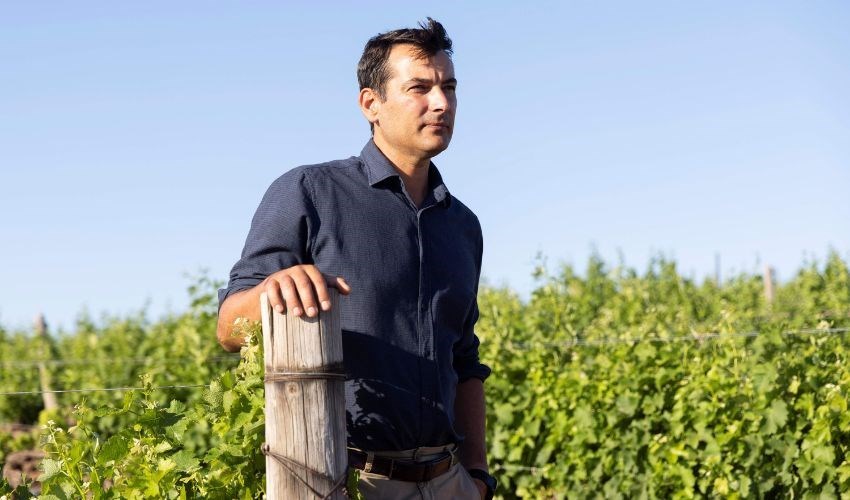
Thys Louw, Diemersdal owner-winemaker
“If you want a happy family farm, post a copy of your will on the fridge. That way you’ll never have problems. Sort it out while everyone is still alive, and don’t try to rule from the grave.”
This is the advice Thys Louw, owner-winemaker of Diemersdal Estate in Durbanville, received from André Oubaas Brink of Groot Phesantekraal regarding the dynamics of family farming.
Louw shared his experiences as the sixth-generation winemaker at Diemersdal during a discussion on family wine farms held at the annual Stellenbosch Woordfees. He started running the farm with his father in 2005 and described the transition as “fairly smooth” with his father Tienie today playing a limited role in the estate’s management.
Different approaches to inheritance
Not everyone shares Louw’s view on wills. Johann Krige of Kanonkop in Stellenbosch, who runs the farm with his brother, believes that no one should inherit directly: “Everything goes into a trust.” Krige is the fourth generation at Kanonkop, where his great-grandfather began making wine in the early 1900s. The first wine under the Kanonkop label was made from the 1973 vintage.
At De Wetshof in Robertson, Johann de Wet is the third-generation owner and CEO. He says he is often asked what it feels like to step into the shoes of his father, Cape wine icon Danie de Wet. “My father was never intimidating, and we’ve always understood one another, seeing as I grew up under the De Wetshof ethos,” he says. “For me, it is about acknowledging that as the family farm’s new proprietor, your role is to make your own responsible mark on the business.”
De Wet’s family has been involved in winemaking in South Africa since the 17th century and has produced wine under the De Wetshof label since the 1970s. He explains that his grandfather, the second son in the family, was dissatisfied with the farm he inherited and subsequently bought De Wetshof. “Our early family history thus shows how complex farm succession can be,” says De Wet.
Discipline, expertise, and the family brand
Krige believes family farms often stumble when there are “too many cooks in the kitchen.” His advice: appoint people based on expertise, not lineage. “If a family member wants to be a winemaker or play another role on the property, they have to make their own mark.”
De Wet agrees. “The best person for the job should be appointed,” he says. “A lack of discipline is often the biggest obstacle. A family farm needs corporate-like discipline where everyone knows their role and responsibility.”
He also emphasises the importance of owner-winemakers attending wine shows and events themselves, rather than sending only marketers. “Consumers need to see the face behind the brand.”
Louw partly agrees, adding: “Your brand must be stronger than the person behind it. The wine should continue even if the individual is no longer involved.”
In a time when wine consumption is declining, De Wet believes family brands have particular value. “Wine will not disappear, just make sure your brand remains trusted and visible.”
Emile Joubert, who moderated the panel discussion, added that consumers often gravitate toward family brands because “they are assured the people on the farms know what they are doing, have been doing it for generations and accordingly have gained the trust of the consumer”.
Long-term vision and community building
Liesl Clüver Rust of Paul Clüver Family Wines in Elgin, part of the fourth generation in the family business, said they recently added the term “family wine” to their labels. “People need to know this is not just another Elgin wine.” She believes family farming brings a unique long-term perspective: “Some decisions may seem unprofitable in the short term, but the benefits show over decades.”
Clüver Rust also explained how her grandmother established a school for farmworkers’ children in 1957, long before SEB and corporate social responsibility systems existed. “She believed you must care for your community and environment.” The school now accommodates around 1 300 students.
Change and transformation
Louw, Krige, and De Wet agree that each generation brings change. For example, Louw experimented by producing the Diemersdal Eight Rows Sauvignon Blanc upon his arrival on the farm, a venture that has achieved significant success. Krige focused Kanonkop on Pinotage and Cabernet Sauvignon, while De Wet increased De Wetshof’s Chardonnay plantings from 60% to 80%.
Krige says he has a bee in his bonnet about the obsession with affirmative action, believing that it is about doing the right thing in creating opportunities for your workers. He financially supports individuals if he believes they have the ability to advance.
“The pressure for transformation will never disappear,” he says, “but it has toned down in the wine industry as the government has begun to realise the wine industry is not a pot of gold.”
Despite changing consumer preferences, Louw remains committed to his principle: “No, I’m not going to switch to de-alcoholized wine. Wine should still have a bit of kick!”